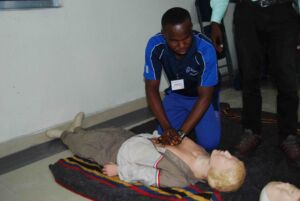
Medical First Aid
Advance Courses
|
5 days
|
English
|
OnsiteDescription
The Medical First Aid course is designed to provide seafarers with the knowledge and skills required to administer first aid in medical emergencies at sea. This training is essential for ensuring the health and safety of crew members, enabling them to provide effective medical assistance until professional medical help can be obtained.
Course Curriculum
- Basic First Aid Principles
- Introduction to first aid and its importance in maritime settings.
- Responsibilities of a first aider.
- Legal and ethical considerations in providing first aid.
- Assessment and Management of Medical Emergencies
- Primary and secondary assessment of casualties.
- Identifying and managing life-threatening conditions.
- Prioritizing treatment and managing multiple casualties.
- Cardiopulmonary Resuscitation (CPR)
- Techniques for performing CPR on adults, children, and infants.
- Use of automated external defibrillators (AEDs).
- Management of choking and airway obstructions.
- Bleeding and Wound Management
- Control of external bleeding using direct pressure, bandages, and tourniquets.
- Management of internal bleeding.
- Treatment of various types of wounds, including cuts, abrasions, and punctures.
- Burns and Scalds
- Assessment and classification of burns.
- Immediate first aid treatment for burns and scalds.
- Prevention of infection and further injury.
- Fractures and Dislocations
- Recognition of fractures, dislocations, and sprains.
- Immobilization techniques and use of splints.
- Handling spinal injuries and maintaining spinal alignment.
- Medical Conditions
- Management of common medical conditions, such as asthma, diabetes, and seizures.
- Recognizing and treating heart attacks, strokes, and allergic reactions.
- Administration of medication as per onboard protocols.
- Environmental Injuries
- Treatment of hypothermia, heat exhaustion, and heat stroke.
- Management of marine stings, bites, and poisoning.
- First aid for drowning and near-drowning incidents.
- Emergency Childbirth
- Basic knowledge of childbirth and complications.
- Immediate care for mother and newborn.
- Handling emergencies related to childbirth at sea.
- Use of Medical Equipment
- Familiarization with onboard medical supplies and equipment.
- Proper use and maintenance of first aid kits.
- Use of communication equipment to seek medical advice.
- Record Keeping and Reporting
- Documentation of medical incidents and treatments provided.
- Reporting requirements and procedures.
- Communicating with shore-based medical support.
- Practical Exercises and Simulations
- Hands-on practice of first aid techniques.
- Simulated scenarios to apply knowledge and skills.
- Role-playing exercises to build confidence and competence.
Course Duration and Certification
- Duration: Typically 3 to 4 days, depending on the training provider and course structure.
- Certification: Successful completion of the course awards a Medical First Aid certificate, which is required for certain shipboard positions under the STCW Convention.
Importance
- Enhanced Safety: Provides seafarers with essential skills to manage medical emergencies, ensuring the well-being of the crew.
- Regulatory Compliance: Ensures compliance with international maritime safety regulations and standards.
- Career Advancement: Necessary for career progression to roles involving medical responsibilities on board.
The Medical First Aid course is crucial for maritime professionals, equipping them with the necessary skills to provide effective medical assistance in emergencies, thereby enhancing the safety and health of all crew members on board.
- Category Advance Courses
- Language English
- Duration 5 days
- Level Advanced
- Assessments Yes
Reviews
4.5
Limited Time Offer